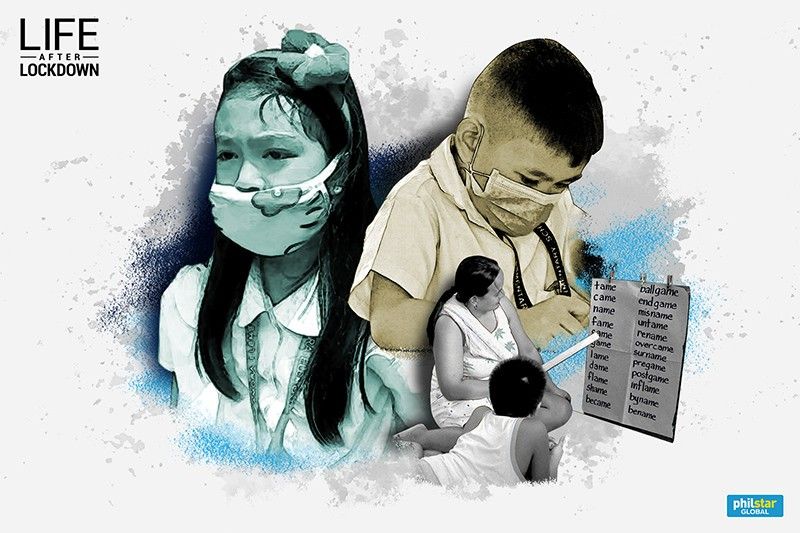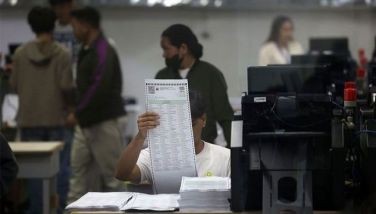Life After Lockdown: Massive shift to online education widens digital gap between rich and poor

Philstar.com's Life After Lockdown is a compendium of references on Filipinos' shift to a new normalcy during a coronavirus pandemic.
MANILA, Philippines — While guidelines on how schools will reopen are not yet clear, the Philippine government is working on a post-lockdown plan for students, parents and educators as they cope with the global pandemic.
Since early March, universities and schools across the country have been closed after President Rodrigo Duterte declared a state of public health emergency due to the increasing number of confirmed cases of the coronavirus disease.
Over 28 million learners in the Philippines have been affected by school closures in an attempt to contain the spread of the deadly virus, data from the United Nations Educational, Scientific and Cultural Organization showed.
With the general community quarantine still in effect in most areas, the Philippine education system faces unprecedented challenges as they rethink their approach and brace for the "new normal."
How public schools will be: Instead of the usual June school opening, classes in public elementary and high schools are slated to resume on August 24, and shall end on April 30, 2021 as the government tries to flatten the curve of viral infections.
- Public school enrollment for school year 2020-2021 will push through on June 1.
- There would be five types of learning delivery options: face-to-face, blending learnings, distance learnings, home schooling and other modes of delivery, according to the Inter-Agency Task Force on Emerging Infectious Diseases (IATF-EID) Resolution 34.
- Physical classes will be conducted in schools allowed to open, with social distancing measures in place.
- If community quarantine is still in place in August, no face-to-face classes shall be conducted. Instead, "blended learning" through internet, radio and television will be utilized as means of instruction.
- Online learning platforms, which are currently tried during the quarantine period, include ICT4ALS, Facebook Chat, Google Classroom, the Aral Muna app and DepEd Commons.
- Through DepEd's Learning Continuity Plan, there will be adjustments in the basic education curriculum, which include key features of the K-12 curriculum, alignment of learning materials, various modalities for delivery and corresponding training for teachers and parents for home schooling.
Canceled activities: Crowd-drawing school events such as Palarong Pambansa, Brigada Eskwela, science fairs, showcase of portfolios, trade fairs, school sports, campus journalism, festival of talents, job fairs and other similar activities will not push through.
- Graduation rites and other end of the school year ceremonies are postponed indefinitely due to the extension of the enhanced community quarantine and government's restriction on mass gatherings.
Summer, remedial and enrichment classes: This shall push through, beginning May 11, 2020 and shall end after a six-week period. This may include Saturday classes. However, a "distance learning modality" will be utilized until further notice and no physical classes could be held.
- Remedial and advancement classes can be shortened when learning competencies are attained. Enrichment classes on the other hand can be extended until the start of school year 2020-2021.
How private schools will be: Elementary and high schools in the private sector have the prerogative to start classes earlier — June 2020. However, no face-to-face instruction could be held prior to August 24, according to the Department of Education.
Commuting and land transport • Movement of people • Industries • Air travel • Education • Reopening of industries and workplaces • Work-from-home setup • Digital economy • Government services • Courts, cases and law enforcement • Religious services and churches • Sports interactions • Sports • Local sports leagues • Dining and beverage • Television, movies, music and events
How about higher education? Most private universities and colleges using the "old academic calendar" (June opening) shall now start in August, said Commission on Higher Education Secretary Prospero de Vera. Because of this, most public and private tertiary schools using a "flexible learning system" would now have a synchronized August semester opening.
- Colleges and universities that are not yet ready for an August opening could opt to start in September or October 2020 (or a later date) via "rolling opening," depending on the prevailing health situation and coordination with the local government.
Effect on free public tertiary education: The Universal Access to Quality Tertiary Education Law would not be affected by the implementation of COVID-19 economic measures (National Budget Circular 580), said the Department of Budget and Management. Because of this, public higher education institutions would continue to be free during the pandemic.
Availability of resources: Now that most schools nationwide are closed, there's been a mad scramble for remote resources that will support the learning and well-being of students.
- Some students, particularly those from low-income households or living in far-flung areas, do not have internet access and gadgets such as laptops, computers and mobile phones.
- House Ways and Means chair Albay Rep. Joey Salceda, in an interview with Dodol B, said that online classes are "anti-poor."
- Salceda said that only 17% of Filipino students have internet access at home while only 3.74% have mobile phones. Only about 5% of students have internet access at home that is stable enough for online learning activities, he added.
- With this, education officials are also considering to deliver lessons through television and radio.
- About 18.7 million households in the Philippines still watch television, according to a 2019 study conducted by global data firm Dataxis. Global media intelligence firm Kantar Media’s 2019 Media Trends Study also showed that up to 52% of Filipinos still own a radio.
- Other modes for home-based learning being eyed include door-to-door delivery of worksheets, take-home learning activity sheets and take-home portfolio completions.
Challenges to parents: There is much disagreement on the opening schools especially to parents, thinking that the risks to children far outweigh the benefits of continuing education.
- Home learning or homeschooling also becomes a heavy burden for parents and guardians who juggle work obligations remotely.
- The pandemic has impacted many parents in their ability to pay for basic needs, including education since they lost their jobs after the implementation of quarantine measures. Data from the Department of Labor showed that about one million workers nationwide have been displaced due to temporary business closures and flexible work arrangements.
- About 300,000 to 400,000 overseas Filipino workers were estimated to be affected by layoffs and salary cuts, according to a research paper by Ateneo de Manila University.
- Despite this, the UNESCO is encouraging international organizations, civil society and private sector partners to ensure that learning never stops at home. It has also released distance learning solutions and recommendations to help parents, teachers, schools and school administrators facilitate student learning.
The Alliance of Concerned Teachers, meanwhile, asked the Department of Education to reconsider the plan of resuming classes on August 24 while there is a growing demand for wide-scale COVID-19 testing in the country. The group presented a five-point demand that the government should address before it opens the school year:
- Employ a comprehensive medical and socio-economic response to the crisis
- Fund and establish health and safety measures at the school level, including free mass testing
- Ensure access to quality education
- Protect education workers’ labor rights and grant necessary benefits
- Conduct democratic consultations with teachers, parents and learners
Parents must help their children adjust to non-physical setup and deal with fear of technology, DepEd said. It added that it is doing everything it can within the "realm of possibility" to continue learning amid the COVID-19 pandemic.
- "So in the meantime, you cannot have nine months of idle children being restrained in their homes... Making them stay at home and having no classes, no learning at all because we are afraid... We have to work around that fear," DepEd Secretary Leonor Briones said.
- Latest
- Trending
































